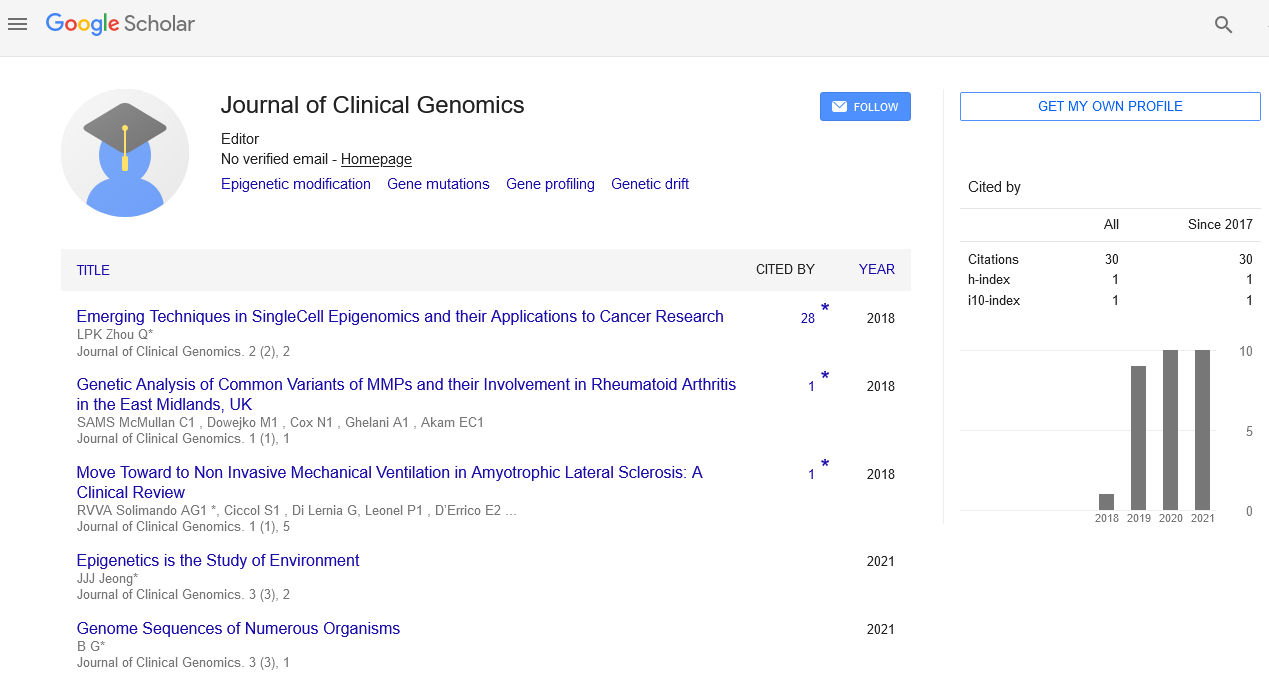Perspective, J Clin Genom Vol: 5 Issue: 1
Genetic Drift's Effect on Genetic Variation
Macedo Tianlong*
1Department of Biological Sciences, University of Southern California, Los Angeles, United States of America
*Corresponding Author: Macedo Tianlong
Department of Biological Sciences,
University of Southern California, Los Angeles, United States of America
E-mail: MacedoTian@usc.edu
Received date: 03 February, 2023, Manuscript No. JCG-23-96327;
Editor assigned date: 07 February, 2023, PreQC No. JCG-23-96327 (PQ);
Reviewed date: 21 February, 2023, QC No. JCG-23-96327;
Revised date: 28 February, 2023, Manuscript No. JCG-23-96327 (R);
Published date: 07 March, 2023, DOI: 10.4172/JCG.1000123
Citation: Tianlong M (2023) Genetic Drift's Effect on Genetic Variation. J Clin Genom 5:1.
Description
Genetic drift is a fundamental concept in evolutionary biology that refers to the random fluctuations in the frequency of gene variants (alleles) within a population over time. It is one of the major forces that shape genetic variation in populations, alongside natural selection, mutation, and gene flow. Genetic drift occurs due to chance events, such as random mating, genetic recombination, and genetic drift can have significant effects on the genetic makeup of populations, leading to changes in genetic variation.
Understanding genetic drift
Genetic drift is a stochastic process that involves random changes in allele frequencies in a population over time due to chance events, unlike natural selection which operates based on fitness and adaptive advantage.
There are several mechanisms through which genetic drift can occur, including:
Random mating: During sexual reproduction, the combination of alleles in offspring is random, leading to changes in the frequency of alleles in the population.
Founder effect: When a small group of individuals from a larger population colonizes a new area, the genetic makeup of the new population may differ from that of the original population due to chance events.
Genetic bottleneck: When a population experiences a significant reduction in size, such as from a natural disaster or human intervention, the surviving individuals may not represent the original genetic diversity, resulting in changes in allele frequencies.
Effects on genetic variation genetic drift
Genetic drift can reduce genetic diversity and result in allele fixation, leading to loss of genetic variation within populations.
Genetic drift can cause independent evolution and genetic differentiation between populations due to random chance events, leading to genetic differences among isolated populations.
Importance of genetic drift in evolutionary biology genetic drift
Genetic drift shapes population dynamics, genetic diversity, and adaptation, providing insights into population evolution and dynamics.
Genetic drift impacts human populations, history, migration, and disease susceptibility; it is difficult in conservation biology, influencing small populations and extinction risk, along with natural selection and gene flow.
Limitations and challenges in studying genetic drift
Genetic drift is a well-established concept in evolutionary biology, studying its effects can be challenging due to several limitations.
Randomness: Genetic drift's randomness hinders prediction, control, experimental study, and mathematical modeling in natural populations.
Complex interactions: Genetic drift's interactions with other evolutionary forces complicate isolating its effects in natural populations, necessitating meticulous study design and data analysis to untangle its effects from other forces.
Time scale: Studying genetic drift's effects in real-time can be challenging due to its long-term operation, necessitating extensive data collection and analysis to detect changes in allele frequencies and genetic variation.
Ethical considerations: Ethical concerns arise when studying genetic drift in human populations, encompassing issues of informed consent, privacy, and equity, necessitating stringent ethical conduct to safeguard the rights and welfare of study participants.
Conclusion
Genetic drift, a fundamental concept in evolutionary biology, influences population dynamics, genetic makeup, and can lead to changes in genetic variation, differentiation, and loss of diversity, studying its effects provides insights into population dynamics, evolutionary mechanisms, and genetic variant distribution, but challenges arise due to its randomness, interactions with other forces, time scale, and ethical considerations.
 Spanish
Spanish  Chinese
Chinese  Russian
Russian  German
German  French
French  Japanese
Japanese  Portuguese
Portuguese  Hindi
Hindi 